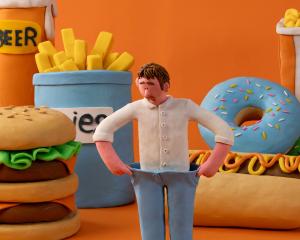Monday marks the start of Mental Health Awareness Week, the main theme of which is "Get in the Game - Training for Happiness". But what, exactly, is happiness? Dunedin psychologist Chris Skellett believes he has the answers. Shane Gilchrist reports.
In other words, specifically in the language he employs in his forthcoming book, When Happiness Is Not Enough, he would be defined as having a rather large "pleasure orientation".
Even our interview, which could be regarded as work for Skellett given he is discussing aspects of his 30 or more years as a psychologist, is a source of enjoyment.
Having answered his phone at the allotted time, he takes a minute or two to make a cup of coffee (gurgle, gurgle), explains that he's searching for a comfortable spot in his office (rustle, rustle) before plonking himself down in a sun-filled spot (silence, albeit briefly).
The reason for the conversation is Skellett's book.
And the reason for the book can be found in its subtitle, Balancing pleasure and achievement in your life. In essence, it's a self-help text aimed at making us pause and reflect on how we live our lives.
Skellett asks, should we tighten up or loosen up? Do we need to stop to smell the roses, or turn off the television and set some goals? And how do we find true fulfilment in life? The answer: by balancing the pleasure of the moment with the satisfaction of achieving personal goals.
Skellett says though his book is "pop-psychology", it nevertheless contains insights he has gained through his career, particularly in his Dunedin-based practice.
A consultant psychologist and executive coach, he has also worked in the public sector and has served on the executive boards of the New Zealand Psychological Society and the New Zealand College of Clinical Psychologists.
When Happiness Is Not Enough is written for anyone who's feeling a little too fat, works too hard, drinks a little too much, who's been told to slow down, is stressed, feels a little bit lazy, wishes they could take more time to play or wants to do more with their life. In short, the book is for everyone, he proclaims.
"Although I'm a clinical psychologist, this is a book for everyday people. There is one chapter there on clinical applications but it is not really applicable; it is more about what happens when these drives get bent out of shape. It's a lifestyle bible for the 21st century."
Self-help books tend to fall into two categories. They are either goal-oriented (success being found through material wealth, getting fit or otherwise) or they are about finding happiness through a spiritual connection with oneself (just be yourself and smell the roses).
Skellett says he plays both sides of the fence.
"There is a complacency inherent in just wanting to `be'; you can get lost in that. Those who live in the moment need to set some goals."
Equally, though, a person can get lost in the quest to achieve.
Thus Skellett also encourages driven, ambitious types to loosen up a bit.
His book hits the shop shelves this weekend, on the eve of Mental Health Awareness Week, which begins on Monday and features the theme, "Get in the Game - Training for Happiness".
"Everybody wants to be happy," Skellett says. "But we need to define happiness.
"Basically, there are two types: pleasure and achievement.
"Pleasure is really important. Good times, good company, good humour ... it is a sensory aspect of life. However, we all confuse the indulgence of pleasure with the satisfaction of achieving a goal.
"A lot of self-esteem is based on pride in what you've achieved. But it is equally predicated on feeling good about who you are. If you can look back on your life and score highly on both counts, that's a fulfilling life.
All this talk of balance raises an obvious question: is Skellett's pleasure-achievement principle a genuinely new idea or merely a repackaging of concepts that have been around for years?
As he states in When Happiness Is Not Enough, "ancient wisdoms are often reworked in newer forms to suit contemporary circumstances and ideas".
Though the principle sits within developments in wider psychological theory, such as the concept of mindfulness and self-awareness ("currently, a lot of cutting-edge psychology is around acceptance, then setting goals"), Skellett emphasises the tips and techniques in his book are only an adjunct to therapy.
"It's not therapy in itself. There is no research behind this, no evidence-based science. I have to be careful; it is a pure pop-psychology thing. It is soft-psychotherapy - i.e., helping you get to know who you are."
Published in New Zealand and Australia by Exisle, When Happiness Is Not Enough is being on-sold to the United States; a United Kingdom publisher is also understood to have expressed interest in it.
All of which begs another question: does Skellett expect any professional backlash?
"No," he says. "Within clinical psychology there is always a range of people, from the applied end people like me who love self-help books, who love working with people - to the academics, who deal in things like anxiety management, a programme of carefully measured treatments.
"All I'm doing is sharing nuggety, self-evident truths, really.
"Some people go to therapists because they want to know themselves better. I tend to attract people who want practical goals for change. That's what I offer, basically."
Skellett likens the pleasure-achievement principle (albeit in a highly generalised sense) to the residents of Dunedin and Auckland.
"In Dunedin, we laugh at Aucklanders rushing around trying to achieve in a business perspective - that goal-oriented life. We have this prejudice about the rat race.
"But in Auckland they ask, 'what are they doing down there? If they were serious about life they would have moved up here or to Melbourne or Sydney'. They see us as complacent and lacking ambition. But we are really happy down here.
"Of course, we are both right. In Dunedin, we can't just be complacent. At the end of the day we can't just be happy about who we are; we also need to feel proud about what we've done."
Modern life's inevitable pressures, be it an increasing accessibility (via computers and/or phones) that offers little respite from the outside world, or an imperative to "just get things done", requires even more focus on managing demands.
Yet there is an irony here: the very act of setting goals might create a sense of pressure that ultimately leads to lower self-esteem should those aims not be achieved. Likewise, attempting to facilitate more pleasure-related activities raises the prospect of a paradigm shift.
Skellett agrees: "I have a friend who is really interested in music. He plays in bands around town but this year he enrolled in a music paper at university and is loving it. But he said, 'bugger it, even my music is becoming an achievement'.
"I was listening to an interview on the radio about a film the other day and I thought to myself, 'I must get along to see that'. It sounds paradoxical, but my wife and I need to plan to go to the movies because it is one of those optional things that get squeezed out.
"Leisure gets biffed around.
"I've been working on leadership programmes with chief executives and leaders of large corporates for the last 10 years and they all carry a large achievement orientation. But they are all, without exception, wanting to find some happiness through just `being'.
"So many leaders think that setting an inspirational goal is enough, but the problem for them is they don't get the buy-in to their vision, and that comes from just being with your team, not leading them. You also have to enjoy relationships at work. Those team-building exercises or retreats ... those connections should happen every day."
That quality of connection is no more important than in the home. Dysfunctional relationships are often a result of a lack of balance between achievement and pleasure, Skellett says.
"Sometimes people are so driven at work that they need to be totally blissed-out at home. Sometimes it is so chaotic at home - say someone has a handicapped child - that work almost becomes a refuge.
"I had a patient who was having relationship problems; he was trying everything he could to connect with his wife, but she was saying, `I just want you to be with me'. So often, true connection in relationships involves just being together. Sometimes you don't have to be doing anything; there is a stillness."
The same principles apply to parenting.
"You want your kids to be achievement-focused. You want to be proud of their achievements, but it is also really important that they just feel good about who they are," Skellett says.
"There is a whole language of parenting. You'll get some people coming around saying, 'Johnny has just learnt to walk'; others might say, 'gosh, he's a funny wee character'.
"You can see it in photo albums, too, with kids doing stupid things - like having their head in a porridge bowl.
"It's about just loving them.
"Obviously, you don't want your kid to just keep putting their head in a bowl of food, but it's a nice relief from `here's a picture of Johnny holding a prize'."












